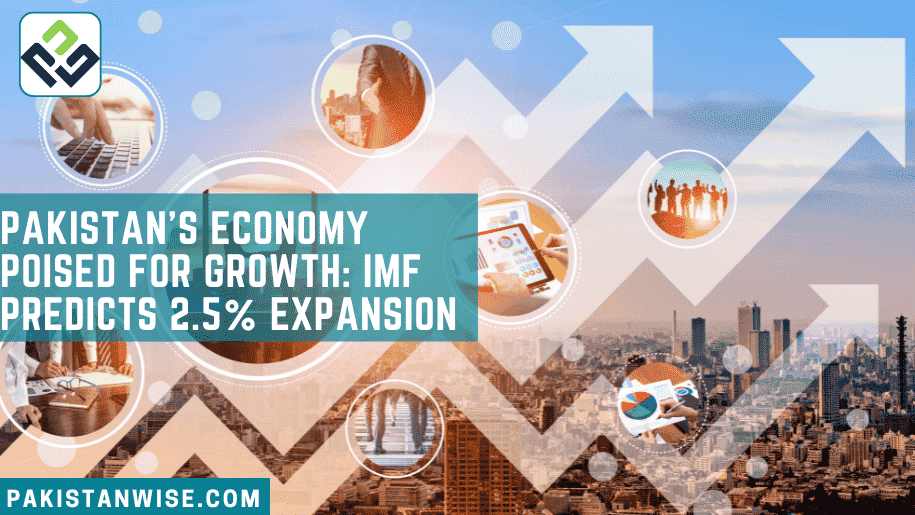ISLAMABAD – The International Monetary Fund (IMF) has forecasted a 2.5% growth rate for Pakistan’s economy in the current fiscal year. This positive projection comes as a result of the country securing a Stand-by Arrangement (SBA) deal with the IMF and receiving financial assistance from friendly nations.
The IMF, in its statement, expressed optimism about Pakistan’s economic prospects, citing an improved economy and predicting a promising future for the South Asian nation. The latest report from the IMF on Pakistan, a country that has faced significant challenges, also anticipates a decrease in unemployment rates and a further decline in inflation over the next year.
Previously, Pakistan experienced a growth rate of -0.5%, but the government led by Prime Minister Sharif claims that the GDP grew by 0.30%. With this year’s budget, Pakistan had set a target of achieving a growth rate of 3.5%, which involved implementing various tax measures. Concurrently, the country expects the unemployment rate to decrease even further. The IMF, headquartered in the United States, has also observed a positive trend in Pakistan’s debt situation. The current debt-to-GDP ratio of 81.8 percent is projected to decrease to 74.9 percent in the coming years.
On Wednesday, the IMF’s Executive Board approved a 9-month Stand-by Arrangement for Pakistan, accompanied by a $3 billion loan. The purpose of this financial package is to address internal and external imbalances and establish a framework for receiving additional financial assistance from both multilateral and bilateral partners.
The IMF’s positive assessment of Pakistan’s economic outlook indicates a potential turning point for the nation’s financial stability. The SBA agreement and financial support from friendly countries have bolstered confidence in Pakistan’s economic prospects. The anticipated growth rate of 2.5% for the current fiscal year signifies a remarkable improvement compared to the previous year’s contraction.
One of the key factors contributing to this positive forecast is the Stand-by Arrangement recently approved by the IMF. The $3 billion loan provided through this program will be instrumental in resolving internal and external imbalances, which have been major concerns for Pakistan’s economy. By addressing these issues, the country aims to achieve sustainable economic growth and attract further investments.
Moreover, the reduction in unemployment rates and inflation is expected to have a positive impact on Pakistan’s economy. As job opportunities increase and inflationary pressures subside, consumer confidence is likely to rise, leading to higher domestic consumption and overall economic expansion.
Related Article:IMF Funding Delay Puts Pressure on Pakistan’s Economy and Investor Confidence
The government’s efforts to manage the country’s debt are also commendable. The current debt-to-GDP ratio of 81.8% has been a significant burden on Pakistan’s economy, but the projected reduction to 74.9% in the coming years indicates progress in debt management. This reduction will free up resources for developmental projects and provide a more favorable environment for future economic growth.
In addition to the IMF’s support, Pakistan has received financial assistance from friendly countries, further strengthening its economic position. These collaborations demonstrate the international community’s confidence in Pakistan’s potential and its commitment to supporting the country’s economic development.
However, it is important to note that challenges still remain. While the IMF’s projections paint a positive picture, Pakistan must continue implementing sound economic policies and structural reforms to sustain and enhance its growth trajectory. Efforts to improve governance, promote business-friendly regulations, and attract foreign investments will be crucial in unlocking Pakistan’s full economic potential.
Related Article :PM Shehbaz actively pursues third IMF meeting for crucial bailout package
Conclusion
Pakistan’s economy is poised for growth, as indicated by the IMF’s optimistic projection of a 2.5% expansion for the current fiscal year. The SBA agreement and financial assistance from friendly nations have provided a significant boost to the country’s economic prospects. Pakistan’s commitment to addressing internal and external imbalances, reducing debt, and fostering a favorable investment climate will be vital in ensuring sustained economic growth and prosperity for its citizens.

